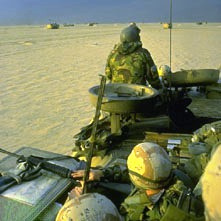Real Security Arrangements in Persian Gulf

The New York Times reported on its October 29, 2011 edition that the United States has decided to strengthen its military presence in the Persian Gulf following the withdrawal of forces in Iraq by the end of the year. The plan envisages new ground combat forces in Kuwait as well as dispatching more naval warships to the region. Moreover, the U.S. is considering to expand its military cooperation with the GCC countries as a whole trying to encourage what Times calls “new security architecture” in the region despite the fact that the United States has military relationships with all GCC members.
Following the announcement by President Obama earlier this month that the U.S. will withdraw its forces from Iraq by the year’s end, the Administration has come under attack from many republicans, particularly those who will possibly challenge Obama in the next year’s presidential elections, that the premature withdrawal from Iraq will increase the instability there and will encourage Iran to fish in the troubled waters and increase its influence in that country. Furthermore, the U.S. came under pressure from some allies in the Persian Gulf that the withdrawal from Iraq will create a power vacuum, inviting Iran to expand its influence there.
The new U.S. decision to augment its forces in the Persian Gulf is designed to respond to these concerns that the U.S. is not going to abandon the region to be replaced by adversaries like Iran. Secretary Clinton’s warning to Iran not to miscalculate the situation following American withdrawal because of “our presence in many countries in the region, both in bases [and] in training, with NATO allies, like Turkey” is a response in that direction.
During the presidential campaigns in 2008, Obama promised to bring back the U.S. troops from Iraq by the end of 2011. On the eve of another election year in America, Obama has found it necessary to do so because first he wants to show to the American people that he is a man of his words and second he wants to get credits for an issue very important to the U.S. public opinion, both of which are assumed to be helpful in the upcoming presidential elections next year.
Is the new security structure in the Persian Gulf going to bring about more security in the region? There is no easy answer to that. The study of recent history might help us better understand the situation. GCC was established in 1981 following the fall of the Shah and Saddam’s aggression against Iran. The main purpose was to create an alliance among the six countries of the Persian Gulf to form a united front overseeing the security of the Persian Gulf. Needless to point out that most GCC members helped Saddam’s regime in its aggression against Iran thus putting the whole region into more turmoil.
The experience of the last 30 years proves the fact that GCC has neither the capacity nor the capability to form an alliance. Its internal differences and rivalry including military conflicts among its members have neutralized any attempt to foster a real and viable alliance. Along the same line, GCC countries are not capable enough to solve their own domestic problems let alone forming an alliance.
The U.S. policy in the region during the last 30 years has been to confront Iran directly or through its friends particularly GCC countries. This policy has not borne fruit. The Obama Administration is making another mistake in depicting Iran as the real threat thus necessitating the dispatch of more troops to the region to confront it. Instead of sowing discord in the region, the U.S. is well advised to promote regional security with the participation of all regional countries. The policy of inclusion rather than exclusion should be the order of the day.

